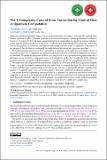| dc.contributor.author | Yuan, Charles | |
| dc.contributor.author | Carbin, Michael | |
| dc.date.accessioned | 2024-07-08T18:47:04Z | |
| dc.date.available | 2024-07-08T18:47:04Z | |
| dc.date.issued | 2024-06-20 | |
| dc.identifier.issn | 2475-1421 | |
| dc.identifier.uri | https://hdl.handle.net/1721.1/155461 | |
| dc.description.abstract | Numerous quantum algorithms require the use of quantum error correction to overcome the intrinsic unreliability of physical qubits. However, quantum error correction imposes a unique performance bottleneck, known as T-complexity, that can make an implementation of an algorithm as a quantum program run more slowly than on idealized hardware. In this work, we identify that programming abstractions for control flow, such as the quantum if-statement, can introduce polynomial increases in the T-complexity of a program. If not mitigated, this slowdown can diminish the computational advantage of a quantum algorithm.
To enable reasoning about the costs of control flow, we present a cost model that a developer can use to accurately analyze the T-complexity of a program under quantum error correction and pinpoint the sources of slowdown. To enable the mitigation of these costs, we present a set of program-level optimizations that a developer can use to rewrite a program to reduce its T-complexity, predict the T-complexity of the optimized program using the cost model, and then compile it to an efficient circuit via a straightforward strategy.
We implement the program-level optimizations in Spire, an extension of the Tower quantum compiler. Using a set of 11 benchmark programs that use control flow, we empirically show that the cost model is accurate, and that Spire’s optimizations recover programs that are asymptotically efficient, meaning their runtime T-complexity under error correction is equal to their time complexity on idealized hardware.
Our results show that optimizing a program before it is compiled to a circuit can yield better results than compiling the program to an inefficient circuit and then invoking a quantum circuit optimizer found in prior work. For our benchmarks, only 2 of 8 tested quantum circuit optimizers recover circuits with asymptotically efficient T-complexity. Compared to these 2 optimizers, Spire uses 54×–2400× less compile time. | en_US |
| dc.publisher | Association for Computing Machinery | en_US |
| dc.relation.isversionof | 10.1145/3656397 | en_US |
| dc.rights | Creative Commons Attribution | en_US |
| dc.rights.uri | https://creativecommons.org/licenses/by/4.0/ | en_US |
| dc.source | Association for Computing Machinery | en_US |
| dc.title | The T-Complexity Costs of Error Correction for Control Flow in Quantum Computation | en_US |
| dc.type | Article | en_US |
| dc.identifier.citation | Yuan, Charles and Carbin, Michael. 2024. "The T-Complexity Costs of Error Correction for Control Flow in Quantum Computation." Proceedings of the ACM on Programming Languages, 8 (PLDI). | |
| dc.contributor.department | Massachusetts Institute of Technology. Computer Science and Artificial Intelligence Laboratory | |
| dc.relation.journal | Proceedings of the ACM on Programming Languages | en_US |
| dc.identifier.mitlicense | PUBLISHER_CC | |
| dc.eprint.version | Final published version | en_US |
| dc.type.uri | http://purl.org/eprint/type/JournalArticle | en_US |
| eprint.status | http://purl.org/eprint/status/PeerReviewed | en_US |
| dc.date.updated | 2024-07-01T07:58:24Z | |
| dc.language.rfc3066 | en | |
| dc.rights.holder | The author(s) | |
| dspace.date.submission | 2024-07-01T07:58:24Z | |
| mit.journal.volume | 8 | en_US |
| mit.journal.issue | PLDI | en_US |
| mit.license | PUBLISHER_CC | |
| mit.metadata.status | Authority Work and Publication Information Needed | en_US |
